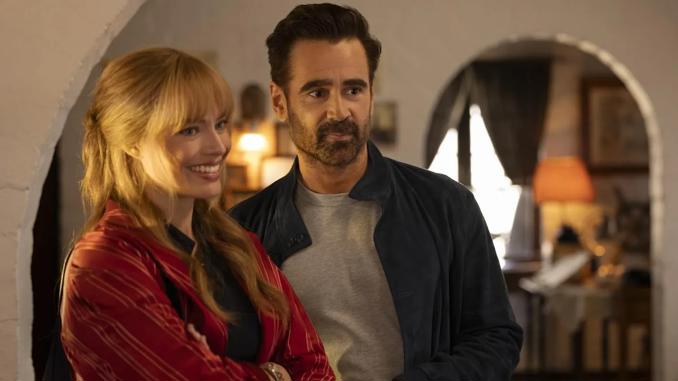A Big Bold Beautiful Journey Is an Engaging Road Trip Until It Crashes Out

As an aficionado of talky cinematic romances, A Big Bold Beautiful Journey arrives with the beguiling alchemy of an odd premise married with fantastic actors that make me hopeful for something great. It centers on two fate-connected strangers who lock eyes at a wedding and end up going on a magical realism road trip together. Margot Robbie is sassy and sharp as Sarah, while Colin Farrell is the quiet, closet romantic David. They have immediate chemistry, but so much emotional baggage you worry about their rental car trunk space.
Kogonada (Pachinko) directs his charismatic leads (and quirky supporting cameos from Kevin Kline and Phoebe Waller-Bridge) through an amusing and whimsical playground literally comprised of random doors that will lead them to share festering past regrets, ongoing moments of self-sabotage, and confront their own burgeoning attraction along the way. The majority of the film unfolds as a witty, two-hander play as Sarah and David give themselves over to the omniscience of a rental car GPS (voiced by an enigmatic Jodie Turner-Smith). It’s persuasive in offering them a big, bold, beautiful journey, which they accept, so set out to follow a mystery itinerary programmed just for them.
Although the premise teeters on being twee, A Big Bold Beautiful Journey mostly works because its self-awareness keeps it from devolving into cliche … until it doesn’t. Unfortunately, the emotional throughline for Sarah and David falls apart in the last leg as screenwriter Seth Reiss makes a maddening decision to separate them when it matters most, and then hurriedly bring them together for an ending so jarring and separate from what came before, that I can only assume it was the product of enforced reshoot shenanigans.
Going in, A Big Bold Beautiful Journey requires its audience to give itself over to what will unfold with the same kind of trust it asks of Sarah and David. If you can do that, there’s plenty to enjoy and explore with these two as they meet at the wedding reception of mutual friends. They immediately fall into the kind of heightened dialogue that only works if the assigned actors are talented enough to sell it with their whole selves, and Robbie and Farrell do just that with plenty of charm and aplomb. Their conversations carry them (and us) through the film’s overall weirdness featuring strange downpours, that sentient GPS and those destination doors that conceal pivotal moments in their lives they must revisit, or relive. But the perk of not being able to hide your past means you can eschew all the performance art of early dating and get right into the meaty, real stuff that you usually hide away until you can’t anymore. And watching them experience that together is often magical.
-

-

-

-

-

-

-

-

-

-

-

-

-

-

-

-

-

-

-

-

-

-

-

-

-

-

-

-

-

-

-

-

-

-

-

-

-

-

-

-








































